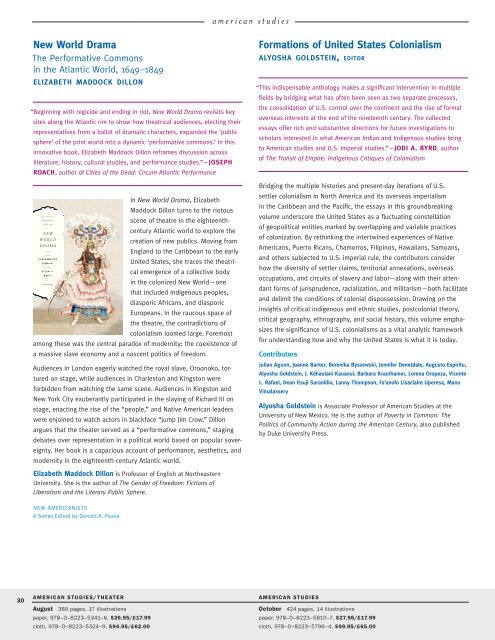x1vuD
x1vuD
x1vuD
You also want an ePaper? Increase the reach of your titles
YUMPU automatically turns print PDFs into web optimized ePapers that Google loves.
american studies<br />
New World Drama<br />
The Performative Commons<br />
in the Atlantic World, 1649–1849<br />
elizabeth maddock dillon<br />
“Beginning with regicide and ending in riot, New World Drama revisits key<br />
sites along the Atlantic rim to show how theatrical audiences, electing their<br />
representatives from a ballot of dramatic characters, expanded the ‘public<br />
sphere’ of the print world into a dynamic ‘performative commons.’ In this<br />
innovative book, Elizabeth Maddock Dillon reframes discussion across<br />
literature, history, cultural studies, and performance studies.”—JOSEPH<br />
ROACH, author of Cities of the Dead: Circum-Atlantic Performance<br />
In New World Drama, Elizabeth<br />
Maddock Dillon turns to the riotous<br />
E lizabeth<br />
M addock<br />
scene of theatre in the eighteenth-<br />
DILLON<br />
N EW<br />
century Atlantic world to explore the<br />
W ORLD<br />
creation of new publics. Moving from<br />
D RAMA<br />
England to the Caribbean to the early<br />
the<br />
PERFORMATIVE<br />
COMMONS<br />
United States, she traces the theatri-<br />
in the<br />
ATLANTIC<br />
cal emergence of a collective body<br />
WORLD<br />
1649–1849<br />
in the colonized New World—one<br />
that included indigenous peoples,<br />
diasporic Africans, and diasporic<br />
Europeans. In the raucous space of<br />
the theatre, the contradictions of<br />
colonialism loomed large. Foremost<br />
among these was the central paradox of modernity: the coexistence of<br />
a massive slave economy and a nascent politics of freedom.<br />
Audiences in London eagerly watched the royal slave, Oroonoko, tortured<br />
on stage, while audiences in Charleston and Kingston were<br />
forbidden from watching the same scene. Audiences in Kingston and<br />
New York City exuberantly participated in the slaying of Richard III on<br />
stage, enacting the rise of the “people,” and Native American leaders<br />
were enjoined to watch actors in blackface “jump Jim Crow.” Dillon<br />
argues that the theater served as a “performative commons,” staging<br />
debates over representation in a political world based on popular sovereignty.<br />
Her book is a capacious account of performance, aesthetics, and<br />
modernity in the eighteenth-century Atlantic world.<br />
Formations of United States Colonialism<br />
alyosha goldstein, editor<br />
“This indispensable anthology makes a significant intervention in multiple<br />
fields by bridging what has often been seen as two separate processes,<br />
the consolidation of U.S. control over the continent and the rise of formal<br />
overseas interests at the end of the nineteenth century. The collected<br />
essays offer rich and substantive directions for future investigations to<br />
scholars interested in what American Indian and Indigenous studies bring<br />
to American studies and U.S. imperial studies.”—JODI A. BYRD, author<br />
of The Transit of Empire: Indigenous Critiques of Colonialism<br />
Bridging the multiple histories and present-day iterations of U.S.<br />
settler colonialism in North America and its overseas imperialism<br />
in the Caribbean and the Pacific, the essays in this groundbreaking<br />
volume underscore the United States as a fluctuating constellation<br />
of geopolitical entities marked by overlapping and variable practices<br />
of colonization. By rethinking the intertwined experiences of Native<br />
Americans, Puerto Ricans, Chamorros, Filipinos, Hawaiians, Samoans,<br />
and others subjected to U.S. imperial rule, the contributors consider<br />
how the diversity of settler claims, territorial annexations, overseas<br />
occupations, and circuits of slavery and labor—along with their attendant<br />
forms of jurisprudence, racialization, and militarism—both facilitate<br />
and delimit the conditions of colonial dispossession. Drawing on the<br />
insights of critical indigenous and ethnic studies, postcolonial theory,<br />
critical geography, ethnography, and social history, this volume emphasizes<br />
the significance of U.S. colonialisms as a vital analytic framework<br />
for understanding how and why the United States is what it is today.<br />
Contributors<br />
Julian Aguon, Joanne Barker, Berenika Byszewski, Jennifer Denetdale, Augusto Espiritu,<br />
Alyosha Goldstein, J. Kēhaulani Kauanui, Barbara Krauthamer, Lorena Oropeza, Vicente<br />
L. Rafael, Dean Itsuji Saranillio, Lanny Thompson, Fa’anofo Lisaclaire Uperesa, Manu<br />
Vimalassery<br />
Alyosha Goldstein is Associate Professor of American Studies at the<br />
University of New Mexico. He is the author of Poverty in Common: The<br />
Politics of Community Action during the American Century, also published<br />
by Duke University Press.<br />
Elizabeth Maddock Dillon is Professor of English at Northeastern<br />
University. She is the author of The Gender of Freedom: Fictions of<br />
Liberalism and the Literary Public Sphere.<br />
NEW AMERICANISTS<br />
A Series Edited by Donald A. Pease<br />
30<br />
AMERICAN STUDIES/THEATER<br />
August 360 pages, 17 illustrations<br />
paper, 978–0–8223–5341–6, $26.95/£17.99<br />
cloth, 978–0–8223–5324–9, $94.95/£62.00<br />
AMERICAN STUDIES<br />
October 424 pages, 14 illustrations<br />
paper, 978–0–8223–5810–7, $27.95/£17.99<br />
cloth, 978–0–8223–5796–4, $99.95/£65.00


